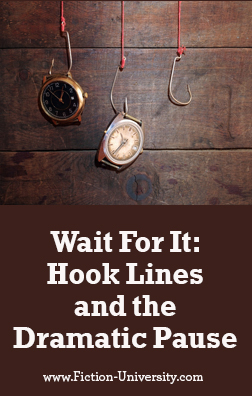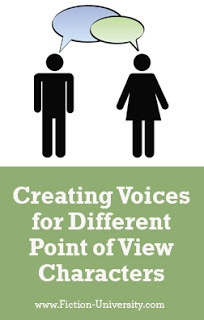Janice Hardy's Blog, page 99
August 17, 2018
The Hidden Risks of Emotional Burnouts in Writing
 By Lesley Vos, @LesleyVos
By Lesley Vos, @LesleyVosPart of the How They Do It Series
JH: Burning out happens to writers every day, and some of them don't even realize it--they just feel blocked or stuck, and don't know what to do about it. Lesley Vos visits the lecture hall today to share tips on what to do, and how to avoid, writers' burnout.
Lesley Vos is a seasoned web writer, content strategist, and blogger. She currently writes at PlagiarismCheck.org, helping peers to discover the world of plagiarism-free content.
Website | Facebook | Twitter
Take it away Lesley...
Read more »Written by Janice Hardy. Fiction-University.com

Published on August 17, 2018 05:03
August 16, 2018
Baking a Series from Scratch…
 By J. Kathleen Cheney, @jkcheney
By J. Kathleen Cheney, @jkcheney Part of the Indie Authors Series
Last time I posted here, I was asked by commenters to talk about how to start a series.That’s a huge topic, and it covers a handful of different quandaries.
As I look at it, there are two main areas:
1. How to PLAN a series, andNow, my own series fall into two separate and fairly equal piles—ones I meant to be series, and ones I didn’t.In fact, most of the other writers I talked to about this topic agreed. Some series are planned, others just happen organically.
2. How to make yourself sit down and WRITE a series.
Read more »Written by Janice Hardy. Fiction-University.com

Published on August 16, 2018 05:47
August 15, 2018
Do You Have a Story with a Twist, or a Twist That Thinks it's a Story?
 By Janice Hardy, @Janice_Hardy
By Janice Hardy, @Janice_Hardy Stories with a great twist are stories readers remember, but make sure your story is more a single punchline.
I ran into a problem when writing my adult urban fantasy novel, Blood Ties . There's a twist, and one of the things that kept changing in the original outline was where that twist was revealed. Did I reveal it early on so the reader got to the "cool part" of the idea first? Did I use it as my midpoint reversal? Or was it an end-of-book shocker?
Then it hit me.
I wasn't writing a story that had a twist, I was setting up a 400-page joke with the twist as the punchline. The novel was all about the reveal, not the story. Which was a major problem.
A twist can't be the whole book. The story has to hold up even if readers know the twist.
Read more »Written by Janice Hardy. Fiction-University.com

Published on August 15, 2018 04:01
August 14, 2018
Writers: Just Say YES When Opportunity Knocks
 By Jonathan Rosen, @houseofrosen
By Jonathan Rosen, @houseofrosenPart of the How They Do It Series
JH: Opportunities are all around us--if we're willing to take advantage of them. Please help me welcome Jonathan Rosen to the lecture hall today, to share some thoughts and advice on why writers should say "yes."
Jonathan Rosen is a transplanted New Yorker, who now lives with his family in sunny, South Florida. He spends his “free” time chauffeuring around his three kids. Some of Jonathan’s fondest childhood memories are of discovering a really good book to dive into, in particular the Choose Your Own Adventure Series, and Hitchhiker’s Guide to the Galaxy. Jonathan is proud to be of Mexican-American descent, although neither country has been really willing to accept responsibility. He is the author of Night of the Living Cuddle Bunnies , which is out now, and the sequel, From Sunset Till Sunrise , coming August 21. You can find him on Twitter, Facebook, FromtheMixedUpFiles.Com, The Tuesday Writers and his own website, WWW.HouseofRosen.com
Website | Goodreads | Facebook | Twitter |
Take it away Jonathan...
Read more »Written by Janice Hardy. Fiction-University.com

Published on August 14, 2018 04:24
August 13, 2018
Wait For It: Hook Lines and the Dramatic Pause
 By Janice Hardy, @Janice_Hardy
By Janice Hardy, @Janice_Hardy All novels need those "Dum--Dum--DUM!" moments to keep readers hooked and turning the pages.
There are a lot of ways to control the pacing on your stories, and one of my favorites is the dramatic pause. Not only does it draw attention to what’s usually a great line, it gives readers a moment to fully appreciate whatever it is you just said. They’re the lines that give readers goosebumps and think, “man, this is gonna be good.”
The dramatic pause is frequently found in hook lines--those one-line phrases that add punch to a scene. Their job is to hook you and keep you reading. What makes them work so well is that they’re often (though not always) set apart in their own paragraph, a moment of silence that catches the eye and makes you pay a little more attention to them. They carry meaning, hint at what’s to come, and often pinpoint some critical aspect of the story in some way.
Read more »Written by Janice Hardy. Fiction-University.com

Published on August 13, 2018 03:00
August 9, 2018
Path to Success: Writer as Entrepreneur
 By Ray Flynt
By Ray Flynt(Part of the Indie Author Series)
If you’re reading this Indie Author Series, you’ve probably already made the decision to become an “indie author.” Congratulations!
Or maybe you’re just beginning your journey in the world of publishing and trying to learn more. Good for you. Knowledge increases your chances for success.
I’ve signed on to contribute a monthly column on the business of writing, but I’d like to spark conversations, prompt questions, compel debate, and explore alternative ideas through your comments.
Chime in. Sound off. We’ll learn together.
Read more »Written by Janice Hardy. Fiction-University.com

Published on August 09, 2018 03:00
August 8, 2018
How Dramatic Irony Can Heighten Tensions and Strengthen Plots
 By Janice Hardy, @Janice_Hardy
By Janice Hardy, @Janice_Hardy Dramatic irony is a fun way to create tension in a story while building a strong plot.
Dramatic irony is a wonderful tool to create mystery and tension in a novel. Not only does it allow you to convey vital information, it lets readers in "on the secret' and makes them feel like they're part of the story.
For those unfamiliar with the term, dramatic irony is when the reader knows information but the characters don’t, and some of the story's tension comes from wondering what will happen when those characters finally meet or realize the truth.
(Here's more on dramatic irony)
There’s a lot of fun for readers to imagine how things would be different if only the characters knew what they knew (this works especially well in the romance department). It's also fun to play one character off another, which can add a nice layer of mystery since the reader might not be sure which character is telling (or knows) the truth and which one is wrong.
Read more »Written by Janice Hardy. Fiction-University.com

Published on August 08, 2018 03:00
August 7, 2018
One Simple Trick to Write Everything Better
 By Laurence MacNaughton, @LMacNaughton
By Laurence MacNaughton, @LMacNaughton Part of the How They Do It Series (Contributing Author)
What if there was one single trick that could help you write better, faster, and easier than ever before? What if that trick could help you organize your thoughts, get started sooner, and finish every writing project, from a blog post to a novel?
There is such a trick. And as a full-time writer, I use it every day.
The trick is deceptively simple. It's a single word: CODE.
That's an acronym for Collect, Organize, Draft, and Edit. Those are the four separate steps in the writing process.
As writers, we tend to try to do several of those steps at the same time, and that's when we often run into problems. Our thoughts get jumbled. We backtrack. Make false starts. Get frustrated.
Read more »Written by Janice Hardy. Fiction-University.com

Published on August 07, 2018 04:49
August 6, 2018
Is That You? Developing Voices for Different Point of View Characters
 By Janice Hardy, @Janice_Hardy
By Janice Hardy, @Janice_Hardy Unique, stand out characters have unique, stand out voices, so it's important to consider how every character in your book sounds.
Voice is important in a novel, and there’s more than just your author’s voice. Characters have voices too, and making those voices distinct in multiple point of view stories helps readers keep track of who’s who.
It’s also a good way to develop those characters into solid personalities, as knowing what they sound like can help you determine who they are (and vice versa).
The Sound of…Someone
Crafting character voices for a multiple POV story isn’t that different from creating the voice for a single POV tale. Everyone has their own speech patterns, favorite turns of phrase, physical reactions or gestures while speaking. But what really shows off a character's voice is their internalization.
Read more »Written by Janice Hardy. Fiction-University.com

Published on August 06, 2018 03:00
August 5, 2018
Writing Prompt: The Free Write: Where Did Everybody Go?
 By Janice Hardy, @Janice_Hardy
By Janice Hardy, @Janice_HardyThis week’s prompt is a free write, so take the seed below and run with it. It doesn’t have to turn into anything (unless you want it to, of course), just let the words flow and see where they go.
Take this situation and see where it goes:
The protagonist wakes up and everyone is gone—except for a strange girl who wasn’t there before.
The details are up to you. Write as much or as little as you’d like. Written by Janice Hardy. Fiction-University.com

Published on August 05, 2018 06:00



